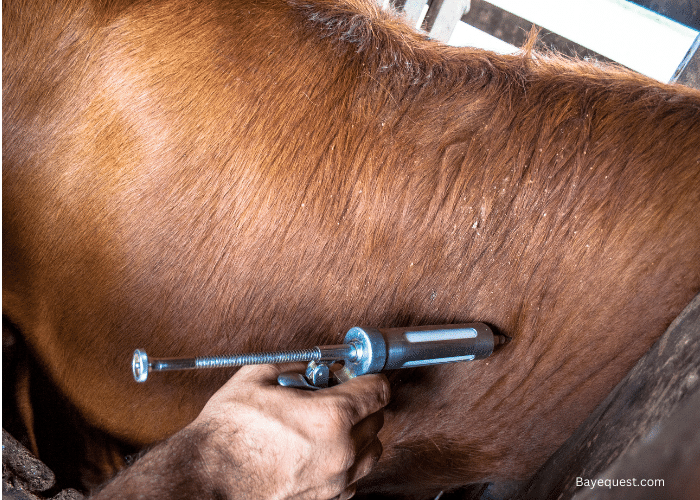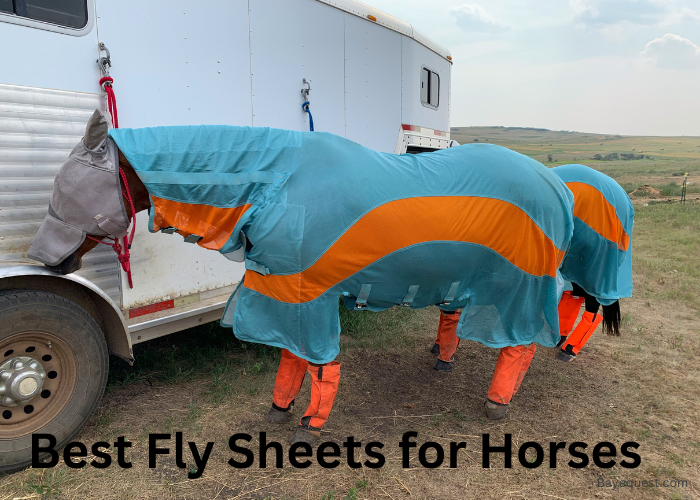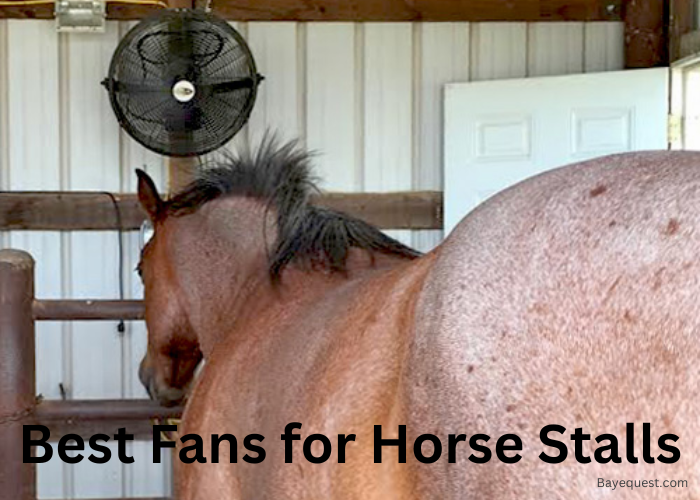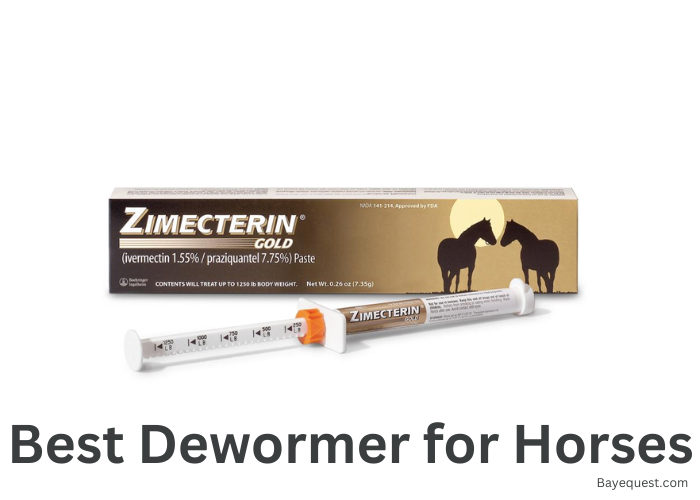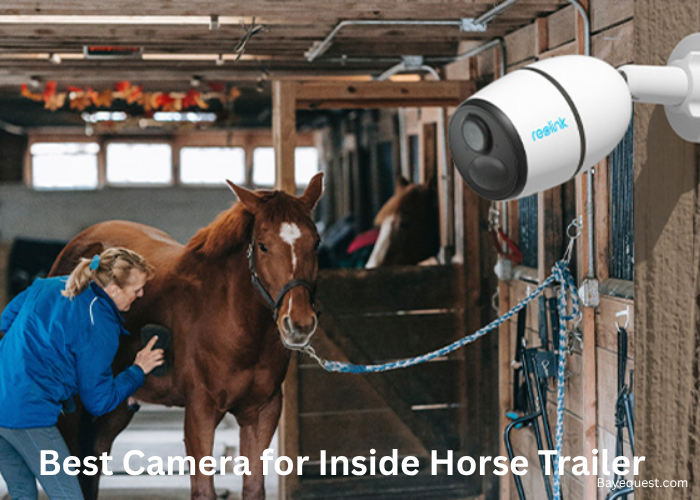Over 60% of equine illnesses are preventable with proper vaccinations. As an experienced equine health professional, I’ve seen the difference vaccines make firsthand.
Many horse owners wrestle with questions about necessary vaccines. This article, “What vaccines do horses need?” sheds light on that. It breaks down essential vaccines every horse needs, guided by years of field expertise.
Whether it’s to safeguard against fatal diseases or maintain herd health, we’ve got you covered.
Dive in to turn your concerns into action for your horse’s well-being.
First things First: Guide to Essential Horse Vaccinations
Here’s a list of essential equine shots:
Core Vaccines
1. EWT/WN (Eastern and Western Encephalitis, Tetanus, West Nile Virus)
2. Rabies
Risk-Based Vaccines
1. Flu/Rhino (Equine Influenza and Rhinopneumonitis)
2. Strangles
3. Potomac Horse Fever
4. Rhinopneumonitis (For pregnant mares)
What is an Equine Vaccine?
An equine vaccine is a medicine given to horses to protect them from diseases. It works by helping the horse’s immune system recognize and fight off harmful germs.
Here’s how it works:
1. Mimics the germ. The vaccine contains parts of the virus or bacteria, or a weakened version, that trains the horse’s body to recognize it.
2. Prepares the immune system. When the horse is exposed to the actual disease later, its immune system knows how to fight it off.
Equine vaccines are usually given as shots, but some can be sprayed into the horse’s nose. They are important for keeping horses healthy and preventing the spread of diseases in barns and fields.
How to Vaccinate Horses
Vaccinating horses is essential for their health and well-being. Here’s a step-by-step guide on how to do it safely and effectively:
Step 1: Prepare the equipment
- Syringe and needle: Use a sterile syringe and needle. The size depends on the vaccine and the horse’s size.
- Vaccine: Check the expiration date. Keep it cool and out of direct sunlight.
Step 2: Restrain the horse
- Halters and lead ropes: Use a halter and lead rope to control the horse.
- Assistant: If possible, have someone hold the horse to keep it calm and still.
Step 3: Choose the injection site
- Neck: The most common site is the neck, in the triangle formed by the neck muscles, shoulder, and spine.
- Chest or buttock: Other sites include the chest or buttock muscles.
Step 4: Clean the area
- Alcohol wipe: Clean the injection site with an alcohol wipe to reduce the risk of infection.
Step 5: Administer the vaccine
- Insert the needle: Hold the needle at a 90-degree angle and insert it quickly but smoothly into the muscle.
- Aspirate: Pull back on the plunger slightly to check for blood. If you see blood, withdraw and choose a new site.
- Inject the vaccine: If no blood, slowly push the plunger to inject the vaccine.
Step 6: Withdraw the Needle
- Remove quickly: Pull the needle out quickly and smoothly.
- Massage: Gently massage the injection site to help distribute the vaccine and reduce soreness.
Step 7: Monitor the horse
- Watch for reactions: Keep an eye on the horse for at least 30 minutes after vaccination for any signs of allergic reaction.
- Record the vaccination: Note the date, type of vaccine, and injection site in the horse’s health record.
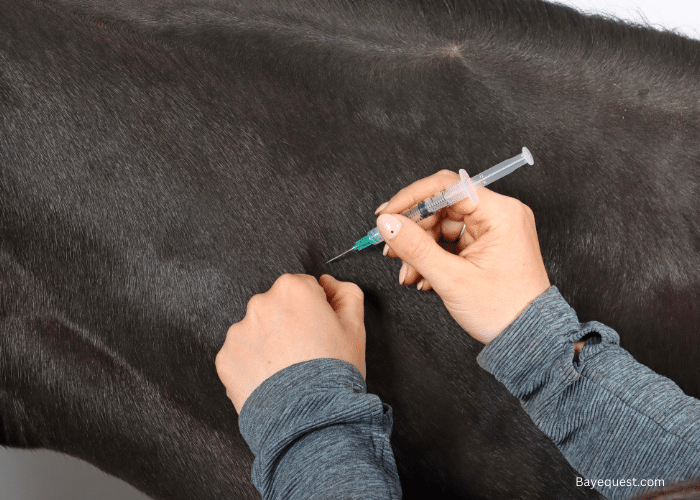
What Shots Do Horses Need?
These are the recommended horse vaccines:
1. EWT/WN (ANNUAL – SPRING)
A four-way vaccine combines four vaccines into one shot. The EWT/WN vaccine protects against Eastern and Western Encephalitis, Tetanus, and West Nile Virus. You can give these vaccines separately, but one shot is easier and works just as well.
Eastern and Western Encephalitis and West Nile Virus are spread by mosquitoes. They cause brain and spinal cord inflammation and nerve problems. Tetanus is a bacteria found in soil and on surfaces. Horses can easily get tetanus, so it’s important to vaccinate them every year.
2. RABIES (ANNUAL – SPRING OR FALL)
Rabies is spread by animals like bats, skunks, and raccoons. Horses can catch rabies, and it’s almost always deadly because there’s no cure. Rarely, a horse might survive, which is surprising to doctors. That’s why the American Association of Equine Practitioners says all horses should get a rabies vaccine every year.
Rabies can make horses have problems with their nerves, making them act “dumb.” Many horse diseases have similar symptoms. If a horse dies after showing these symptoms, it should be tested for rabies. It’s important to be careful when handling the horse to avoid spreading rabies.
3. FLU/RHINO (SEMI-ANNUAL – SPRING AND FALL)
The Flu/Rhino vaccine isn’t a must-have according to the American Association of Equine Practitioners (AAEP), but it’s a good idea to give it to horses every six months, especially if they travel.
These diseases spread easily from one horse to another. Some places might not vaccinate for Flu/Rhino, or only do it once a year.
The key is to think about the risks. If your horses don’t travel or mix with others much, they might not need this vaccine. There’s a shot for this vaccine, but also a popular nose spray version for the flu.
4. STRANGLES (ANNUAL – SPRING)
Strangles is a bacterial disease that causes swollen lymph nodes and pus discharge from the nostrils. Infected horses may have a high fever and make a choking sound when they breathe.
Strangles is usually not deadly, but it can be if it affects the horse’s internal lymph nodes or if swelling in the throat blocks the airway.
There are two types of strangles vaccines: a live virus given as a nasal spray and a dead virus given as a shot. At IEC, we suggest using the live virus vaccine because it works well.
5. POTOMAC HORSE FEVER (SEMI-ANNUAL – SPRING AND FALL)
Potomac Horse Fever (PHF) is a bacterial infection that’s spreading in some areas. Horses can get it by eating dead insects like mayflies. It’s been showing up more in south-central Wisconsin, but it’s still pretty rare.
The vaccine for PHF doesn’t work against all types of the infection, but it does seem to make the illness less severe if a vaccinated horse gets sick.
So, we suggest vaccinating your horse against PHF. If you want to learn more about Potomac Horse Fever, check out our article or give us a call.
6. RHINOPNEUMONITIS (AS NEEDED DURING PREGNANCY)
We recommend a horse vaccine for pregnant mares to protect against a type of Rhinopneumonitis. This virus can cause mares to lose their pregnancies.
The vaccines Prodigy and Pneumabort K are effective in preventing this. Your pregnant mare should get this vaccine at five, seven, and nine months of pregnancy.
7. EQUINE ENCEPHALOMYLITS VIRUSES
Eastern, Western, and Venezuela Equine Encephalomyelitis are spread by mosquitoes from birds or rodents to horses and humans. Horses and humans can’t spread the disease to others.
The viruses can cause fever and problems with the nervous system, like depression, trouble walking behaviour changes, and seizures. Venezuela Equine Encephalomyelitis hasn’t been seen in the U.S. for a long time and must be reported.
The death rate is 70-90% for horses with Eastern or Venezuela Equine Encephalomyelitis, and about 50% for horses with Western Equine Encephalomyelitis.
All horses should get vaccinated in the spring before mosquito season. In warm places like Florida, they might need another shot in the fall (every 6 months).
Equine Herpes Virus Type 1 (EHV-1) and Type 4 (EHV-4) can cause respiratory infections in horses, called Rhinopneumonitis.
They mainly affect the upper respiratory tract, causing fever, nasal discharge, and sometimes coughing. EHV-1 can also lead to neurological disease, abortion, and foal death.
These viruses spread through the air or by direct contact with secretions from the nose, on equipment, or in drinking water. Young horses often get infected with EHV-1 and EHV-4, but symptoms usually show up as they get older and meet new horses.
Vaccination is recommended to prevent abortion in pregnant mares and to reduce the signs and spread of respiratory disease in young and at-risk horses.
The vaccine doesn’t stop the neurological form of EHV-1. Adult horses at risk are usually vaccinated every 6 months.
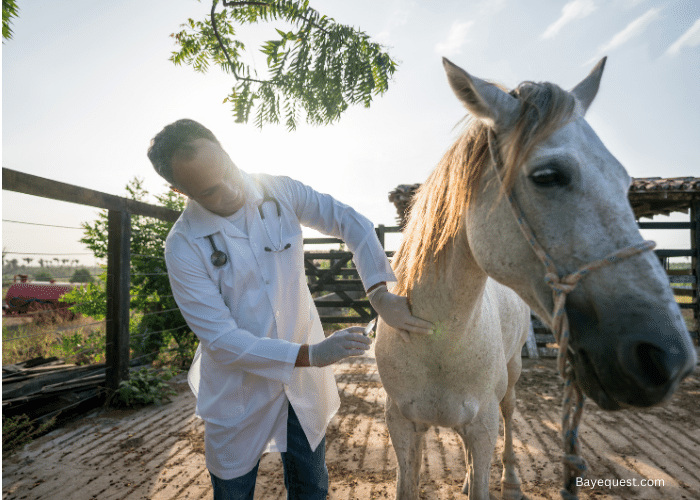
Timing is Everything
The age, health status, and lifestyle of your horse will influence the timing of vaccinations. Typically, foals receive their first shots at three to four months of age, followed by a series of booster shots. Adult horses often require annual or semi-annual boosters.
Although this guide provides a broad overview, always consult a veterinarian for a personalized horse vaccination. Each horse is unique, and geographical considerations can also influence vaccine requirements.
Recommended Vaccines for Horses: Summary
| Horse shots | Disease Prevented | Equine Vaccination schedule | Additional Important Factors |
|---|---|---|---|
| EWT/WN | Eastern and Western Encephalitis, Tetanus, West Nile Virus | Annual – Spring | Spread by mosquitoes (Encephalitis, West Nile Virus), and soil (Tetanus). One shot combines all. |
| Rabies | Rabies | Annual – Spring or Fall | Spread by animals like bats, skunks, raccoons. Fatal if contracted, mandatory vaccination advised. |
| Flu/Rhino | Equine Influenza and Rhinopneumonitis (EHV-1, EHV-4) | Semi-Annual – Spring and Fall | Recommended for traveling horses. Administered as a shot or nasal spray. |
| Strangles | Strangles | Annual – Spring | Causes swollen lymph nodes and nasal discharge. Live virus nasal spray recommended. |
| Potomac Horse Fever | Potomac Horse Fever | Semi-Annual – Spring and Fall | Spread by ingesting dead insects. Vaccine may reduce severity. |
| Rhinopneumonitis | Rhinopneumonitis (Pregnancy Loss) | As Needed During Pregnancy | Administer at 5, 7, and 9 months of pregnancy. Vaccines like Prodigy and Pneumabort K. |
| Equine Encephalomyelitis | Eastern, Western, and Venezuela Equine Encephalomyelitis | Annual – Spring (or every 6 months in warm climates) | Spread by mosquitoes from birds or rodents. High fatality rates, especially for Eastern and Venezuela strains. |
FAQs
What vaccines do horses need yearly?
Horses need annual vaccinations for Tetanus, Encephalomyelitis, West Nile Virus, and Rabies. These core vaccines protect against common and severe diseases. Consult with a vet for any additional vaccines based on the horse’s health, lifestyle, and regional disease risks.
Flu Rhino vaccine for horses side effects
Side effects of the Flu Rhino vaccine in horses may include soreness at the injection site, fever, lethargy, and decreased appetite. These symptoms are typically mild and temporary. If severe reactions occur, contact your veterinarian for guidance and possible treatment options.
How often should horses be vaccinated?
The frequency of equine vaccinations depends on the vaccine and the horse’s exposure risk. Core vaccines are generally given yearly, while others, like those for Influenza and Rhino (EHV), may require boosters every 6 months, especially for horses at higher risk or with increased exposure.
Can you vaccinate and deworm at the same time?
Yes, you can deworm and vaccinate a horse at the same time. However, it’s important to monitor for adverse reactions, as combining treatments can sometimes stress the horse’s system. Consult your veterinarian to ensure both treatments are administered safely and effectively.
Read also: How Often to Deworm a Horse.
What Vaccinations Does a Horse Need? Wrap up
At a minimum, your horse should get EWT/WN and Rabies vaccinations once a year. We generally suggest that your horse gets EWT/WN, PHF/Rabies, Strangles, and Flu/Rhino in the spring, and PHF and Flu/Rhino in the fall.
Depending on your horse’s risk factors, you might be able to skip some vaccines. Always talk to your veterinarian to determine your horse’s best vaccination plan.




